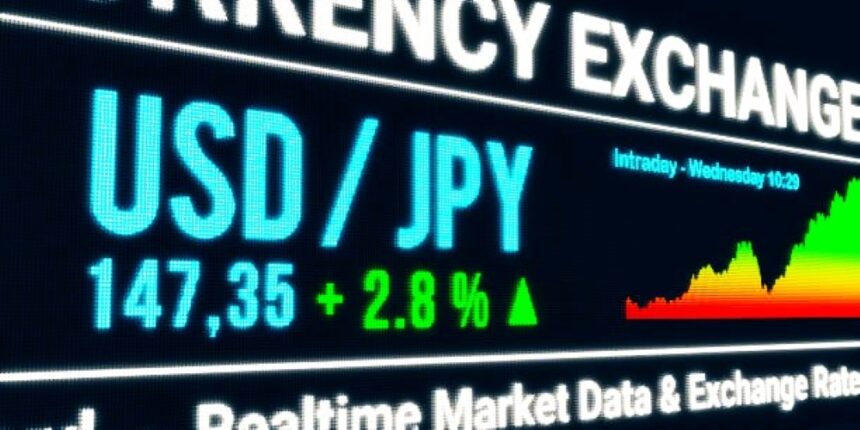Japanese yen falls as the Bank of Japan appears unwilling to hike interest rates.
The Japanese yen (JPY) fell against the US dollar (USD) on Tuesday, on growing fears that the Bank of Japan (BoJ) is not in a hurry to hike interest rates. Following the Bank of Japan’s policy announcement on Friday.
BoJ Governor Ueda may consider boosting interest rates if the economy and inflation meet the estimates in the quarterly outlook report.
According to BoJ Governor Kazuo Ueda, it is “appropriate to raise rates if trend inflation heightens in line with our forecast.” According to BoJ Governor Ueda, Japan’s real interest rate remains severely negative, encouraging the economy and causing prices to rise. He also stated that “they will raise interest rates if the economy and prices move in line with the forecasts in the quarterly outlook report.”
Shunichi Suzuki, Japan’s Finance Minister, said on Tuesday that he is “monitoring the impacts of central banks’ monetary policies.” Suzuki expressed confidence that the Bank of Japan will execute appropriate monetary policy measures while working closely with the government.
The Japanese yen pair may fall as expectations rise for further rate reduction by the US Federal Reserve (Fed) in 2024. According to the CME FedWatch Tool, markets are pricing in a 50% chance of a 75 basis point cut. By the end of this year, the Fed’s interest rate will be between 4.0 and 4.25%.
Daily Digest Market Movers: The Japanese yen remained low under the dovish BoJ.
The Jibun Bank Japan Composite Purchasing Managers Index (PMI) fell to 52.5 in September from a final reading of 52.9 in August, the highest in 15 months. Despite this decline, private sector activity has increased for the ninth straight month this year, with the service sector driving the expansion. The Services PMI rose to 53.9 in September, from 53.7 in the previous month.
The S&P Global Composite PMI expanded at a slower rate in September, reaching 54.4 from 54.6 in August. The Manufacturing PMI unexpectedly declined to 47.0, indicating contraction, while the Services PMI rose faster than expected, reaching 55.4.
Neel Kashkari, president of the Minneapolis Fed, feels that additional interest rate reduction should and will occur in 2024.
Minneapolis Fed President Neel Kashkari stated on Monday that he believes there should and will be significant interest rate reduction in 2024. However, Kashkari anticipates future cuts to be smaller than those made at the September meeting, according to Reuters.
According to Chicago Fed President Austan Goolsbee, “many more rate cuts are likely needed over the next year, rates need to come down significantly.” Furthermore, Atlanta Fed President Raphael Bostic stated on Monday that the US economy is near to normal inflation and unemployment rates, and that the central bank’s monetary policy must “normalize” as well, according to Reuters.
On Monday, Japan’s new “top currency diplomat,” Atsushi Mimura, said in an interview with NHK that the Previous yen carry trades are believed to have been mostly unwound. Mimura warned that if such trades resume, it might lead to more market instability. “We are always monitoring the markets to ensure that does not happen,” she said.
Japan’s Consumer Price Index (CPI) rose to 3.0% year on year in August.
Japan’s Consumer Price Index (CPI) rose to 3.0% year on year in August, up from 2.8% earlier, marking the highest level since October 2023. Furthermore, the Core National CPI, excluding fresh food, reached a six-month high of 2.8%, rising for the fourth consecutive month and meeting market forecasts.
Federal Reserve Chair Jerome Powell responded to the dramatic 50 basis point rate decrease, saying, “This decision reflects our increased confidence that, with the necessary modifications to our policy approach, we can sustain a Maintain a solid labor market, generate modest economic growth, and reduce inflation to a sustainable 2% level.”









